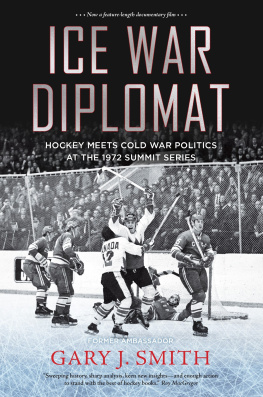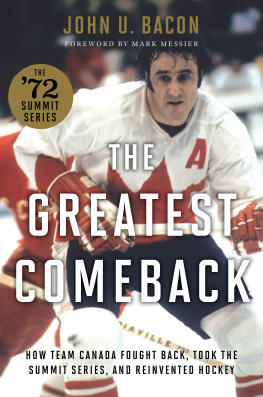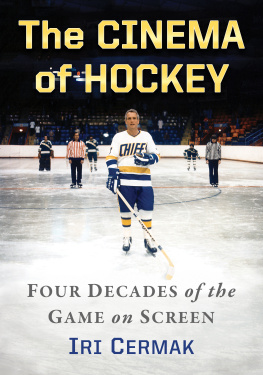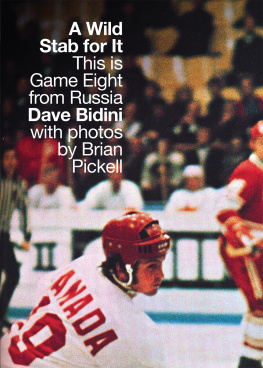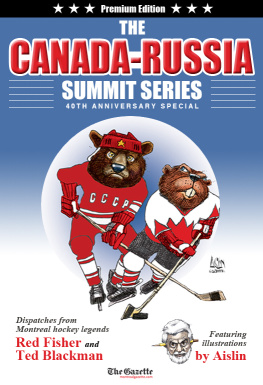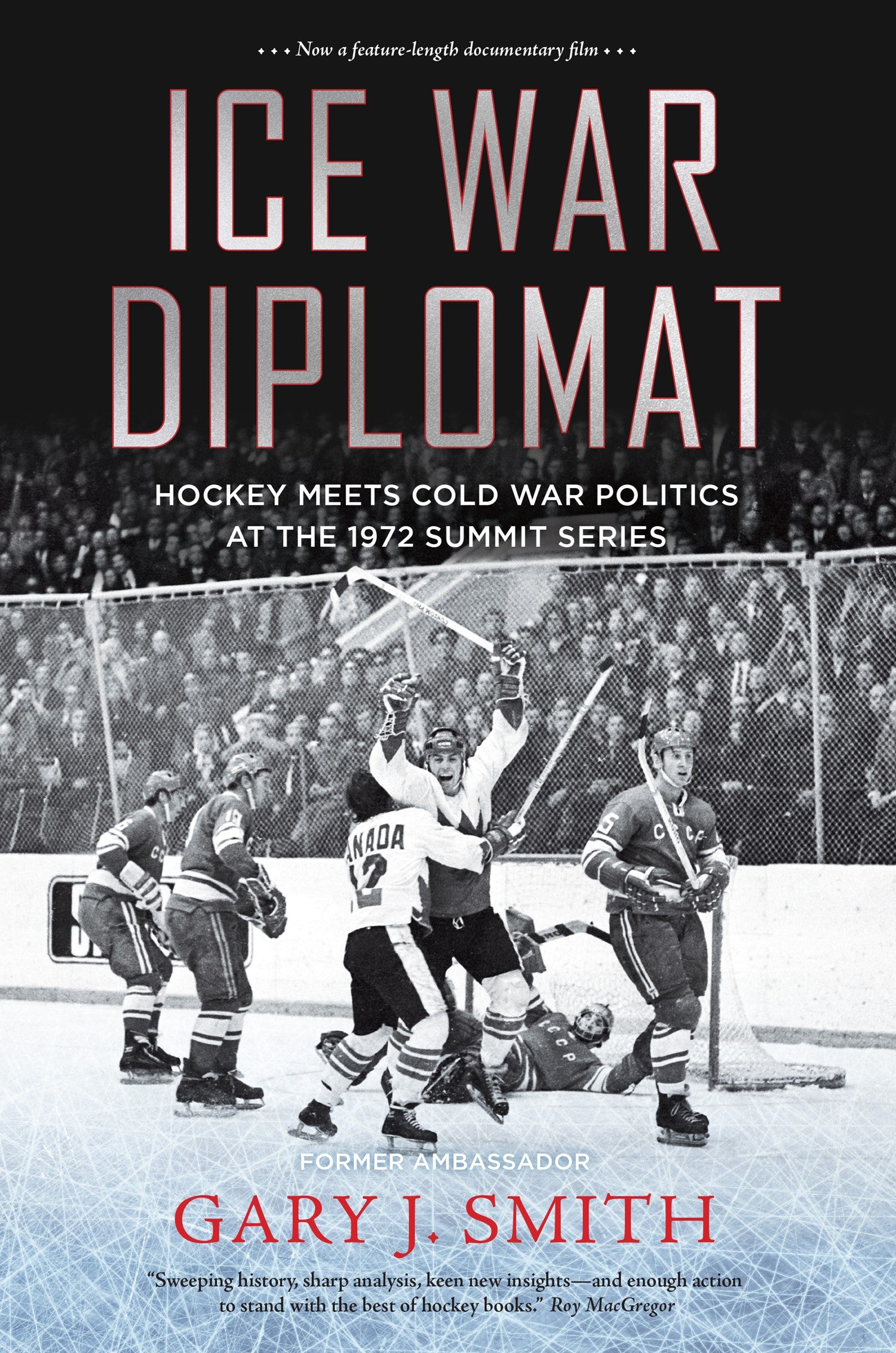Praise for Ice War Diplomat
In 1972, Canadas birthright, our game, hockey, was suddenly open to inspection. Gary J. Smith wasnt asked to referee the now famous hockey series between the Soviet Union and Canada, he was asked to referee something greater. He was handed the Cold War. He was twenty-eight years old. With suspicion aroused on both sides, each whisper, every secret, kept feeding into the question, What is hidden in their hearts? Such a question bears discussion and publicity. One man had the necessary skill set. Finally, the incredible story of the glue in 72. The Ice War Diplomat.
Ron MacLean, host of Hockey Night in Canada
The CanadaRussia series was a truly iconic moment in hockey history. But it was morea fascinating time in Canadian diplomatic history. Gary J. Smith was a young, Russian-speaking diplomat with a ringside seat. His story is engaging and brilliantly told.
Bob Rae, ambassador and permanent representative of Canada to the United Nations
They were just supposed to be exhibition games, but the Summit Series turned out to be bigger than the Stanley Cup, and a highlight of my career. I enjoyed Gary J. Smiths accurate and excellent account. Ice War Diplomat brought back very good memories.
Frank Mahovlich, hockey legend and Team Canada member
This vivid portrayal of the characters who made the Series happen is a thriller! Smith renders brilliantly the diplomatic skills and sharp minds displayed off-ice and in backrooms that delivered not just a unique hockey faceoff, but a top foreign policy priority of the Canadian PM . His own backstory as a first-time diplomat makes us relate even more.
Anne Leahy, ambassador of Canada to Russia 1996-1999; first secretary, Canadian embassy to the USSR 1980-1982
An engaging and colourful eye-witness account, Ice War Diplomat greatly increases our understanding of the 1972 Summit Series between Canada and the USSR, by focusing on its little-known but crucial diplomatic history. As Smith shows, staging the series that led to one of Canadas most iconic sports moments was first and foremost a triumph of diplomacy.
Brendan Kelly, head of the Historical Section at Global Affairs Canada and author of
The Good Fight: Marcel Cadieux and Canadian Diplomacy, winner of the 2020 J.W. Dafoe Book Prize
Gary J. Smith is the original hockey Insider. His Ice War Diplomat contains sweeping history, sharp analysis, keen new insights, and enough action to stand with the best of hockey books. But there is so much more here, much of it unknown before. He was the only one with full access to both sides during the 1972 Summit Series and, believe me, the games off the ice were often as challenging as those on. Its like seeing the series all over again, with sharper eyes.
Roy MacGregor, author, columnist and feature writer for
The Globe & MailCanadian hockey fans remember Canadas breathtakingly narrow victory in the fabled 1972 eight-game series against the Soviet Union. Now Gary J. Smith, then a young diplomat at the Canadian embassy in Moscow assigned to be Canadas link with the Soviet hockey authorities, offers the definitive account of how the Soviets viewed, prepared for and reacted to the series. A tour de force of reportage, history and analysis.
Jeffrey Simpson, national columnist for
The Globe & MailA rare side of the Summit Series story that has never been told. A fascinating insider view of how Canada/Russia 72 was much bigger than the game.
James Duthie, TSN hockey host

Hockey Meets Cold War Politics at the 1972 Summit Series
Gary J. Smith

For Laurielle ( RIP ), who shared the extraordinary diplomatic adventure
Copyright 2022 Gary J. Smith
1 2 3 4 5 26 25 24 23 22
All rights reserved. No part of this publication may be reproduced, stored in a retrieval system or transmitted, in any form or by any means, without prior permission of the publisher or, in the case of photocopying or other reprographic copying, a licence from Access Copyright, .
Douglas and McIntyre (2013) Ltd.
P.O. Box 219, Madeira Park, BC , V 0 N 2 H 0
www.douglas-mcintyre.com
Cover photograph credit to Frank Lennon / Toronto Star / Library and Archives Canada / e008440339
All photographs from the collection of Gary J. Smith, unless otherwise noted.
Edited by Derek Fairbridge
Indexed by Chandan Singh
Cover design by Anna Comfort OKeeffe
Text design by Libris Simas Ferraz / Ona Publishing
Printed and bound in Canada



Douglas and McIntyre acknowledges the support of the Canada Council for the Arts, the Government of Canada, and the Province of British Columbia through the BC Arts Council.
Library and Archives Canada Cataloguing in Publication
Title: Ice war diplomat : hockey meets cold war politics at the 1972 Summit Series / Gary J. Smith.
Names: Smith, Gary J. (Diplomat), author.
Description: Includes index.
Identifiers: Canadiana (print) 2022015063 X | Canadiana (ebook) 20220152640 | ISBN 9781771623179 (softcover) | ISBN 9781771623186 ( EPUB )
Subjects: LCSH : Smith, Gary J. (Diplomat)Anecdotes. | CSH : Canada-U.S.S.R. Hockey Series, 1972.
Classification: LCC GV 847.7 . S 65 2022 | DDC 796.962/66dc23
Table of Contents
Introduction Faceoff
The first Canadians known to lace up their skates and play ice hockey in Russia, it would seem, were rugged soldiers of the Canadian Siberian Expeditionary Force during the winter of 191819, in Vladivostok, in the Russian Far East, abutting the Pacific Ocean. The Force, comprised of close to forty-two hundred men and one nursing matron marshalled from across Canada, had set sail from Vancouver and Victoria and arrived in the Siberian city just as the First World War was winding down in Western Europe. Britain had asked the Canadian government for their deployment as part of a large international force led by a Japanese lieutenant-general. Their mission was to stabilize the Eastern front against Germany after the new Bolshevik government led by Vladimir Lenin had signed an agreement to withdraw Russia from the war. There were hundreds of thousands of tons of residual military equipment to protect; a desire to ensure Germany did not gain access to Siberias vast natural resources; and the goal of keeping the Pacific port open to those fleeing the revolution and the fighting. Most of Siberia was still under the control of anti-Bolshevik White forces.
The Canadian commander, Major General James H. Elmsley, had a problem on his hands. He had dispatched the North West Mounted Police squadron westward by rail to Omsk, over four thousand kilometres away, but the bulk of his troops were assigned to protection and police duties in the Vladivostok area, far from any fighting. They were bored and there had been a mutiny in Victoria by some of the Quebec members of one battalion of the Canadian Rifles, who felt this was an ill-advised operation for King and Country and who had no desire to be involved in a revolutionary civil war in a distant land.

